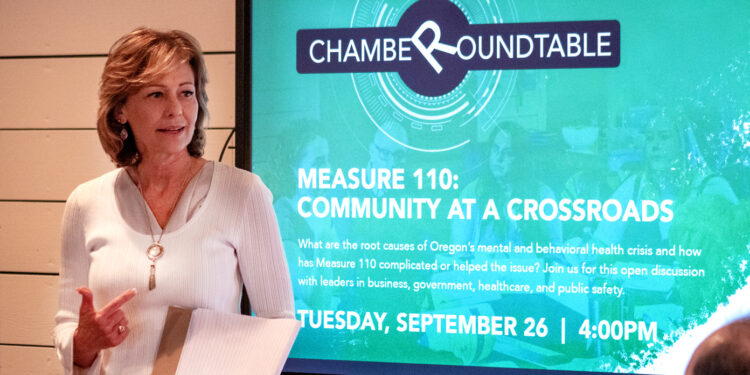Bridging Perspectives: Springfield Gathers to Discuss Measure 110

The monthly Chamber Roundtable program brings members together to contemplate issues of interest to the business community. Topics, often controversial in nature, are informed in part by the Springfield Chamber’s business climate survey. The poll indicated public safety, crime prevention, access to healthcare, and similar quality of life issues as imperatives to building a healthy and competitive business climate.
The September 26th Roundtable brought together business and community leaders to talk about the root causes, perceptions, and realities of the behavioral health crisis and how Measure 110 – the Drug Addiction Treatment and Recovery Act – has complicated or helped solve for these issues.
Background
In November of 2020, Oregonians passed Ballot Measure 110 which, in effect, decriminalized possession of hard drugs and earmarked hundreds of millions of dollars in cannabis tax revenue for building a statewide addiction treatment network. Three years later, many see the strategies to be falling short of the promise to get more people in treatment and recovery programs. Some say it is failing miserably, tying the hands of law enforcement, contributing to a sharp increase in drug-related deaths and street crimes, and even a misuse of public funds. Others say it has fallen somewhere in between, that the prevention and treatment funding is long overdue and necessary to stand up recovery and rehabilitation resources. But even the treatment and recovery providers say it hasn’t helped get people in the door to get them the help they need.
The debate has brought about national attention to the state and placed pressure on elected officials and public health agencies to fast track and correct the detrimental impacts playing out across the state, at the hyper local level. The legislature is studying potential reforms to propose in the 2024 short session while two initiative petitions to fully repeal the law have been filed as a backstop measure should reforms fall short of public expectations.
Measure 110 Roundtable Discussion – Part I
Heather Jefferis of the Oregon Council for Behavioral Health (OCBH) was invited to present on the state of behavioral health services, the successes and shortcomings of Measure 110 funding and implementation. Participants came ready to hear diverse opinions and perspectives shared between business and nonprofit executives, caregivers, law enforcement, public officials, and civic leaders.
Attendees reflected on personal experiences and stories of those who refuse treatment, families who have little to no intervention power, and a sense of deteriorating public safety such as risk of exposure to vulnerable populations, children, and in schools, parks, public spaces, and places of businesses.
Measure 110 – Community at a Crossroads Part II
The program ended with many questions left unanswered. How has Measure 110 impacted law enforcement officials’ effectiveness in fighting drugs and street crimes? What policy, funding, and partnerships are proposed to get us back on track? Are we spending money in the right way and on the right things? How do we get people in the door who don’t want to or simply can’t seek help for themselves?
To that end, October’s Roundtable will center on solutions and a facilitated discussion with Springfield Police Chief Andy Shearer. Join us Thursday, October 26th 4:00 – 5:30pm at the Springfield Justice Center for Roundtable +Tour, Measure 110: Community at a Crossroads, Part II.
Please take a few minutes to weigh in with your perspective and questions as we work with policymakers to address the issues you care most about.
Discover more from Springfield Bottom Line
Subscribe to get the latest posts sent to your email.






